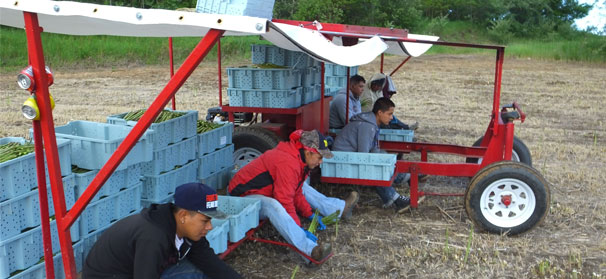
Jun 18, 2015Buyer beware: Farm labor contracts require scrutiny
Craig Anderson had some pointed advice for asparagus growers who were contemplating the use of farm labor contractors this spring to help fill gaps in their shrinking employment pool.
“We know a lot of them say, ‘just give me a check and I’ll take care of it,'” Anderson, manager of agricultural labor and safety services for Michigan Farm Bureau, said.
“You’ve seen those infomercials that say, ‘$19.95, plus shipping and handling.’ Well, it’s the shipping and handling where we have significant challenges when we look at the use of contractors,” Anderson said at the 2015 Oceana Asparagus Day in New Era, Michigan.
He said contractors operating in the H-2A program are generally no different than other farm labor contractors operating within the confines of the Migrant and Seasonal Agricultural Worker Protection Act (MSPA), and there are cautions in using both.
“The first question is are you a licensed contractor? How are you going to file the application? Some of them will say, ‘don’t worry about that.’ Here’s the challenge: The application is limited to a particular area. Last week, we met with a contractor with an operation in Florida. There was no indication whatsoever he had a separate application for the workers here. That automatically is a red flag.”
He said growers must make specific requests for contractors to have their farms’ correct information on record.
“We need the crops and activities and the location where they’re going to be working,” Anderson said. “How many fields do you have? If they’re not all on one farm, are you using your home address? That’s not usually the case in our industry.”
He said the application must include descriptions of each location, and harvesting or other activity as well.
“If it says your workers are going to be anywhere in Michigan, you become liable for any activities out there for that contractor.”
He said it’s important to request a copy of the contractor’s licensing and paperwork, and keep it for the farm’s records. This has to include specific information about housing and transportation arrangements, even if they’re being provided by the contractor.
The specific requirement for the contractor to have a surety bond in an H-2A arrangement means that paperwork also has to be in order and on file.
“If it doesn’t specify who is the payee for the surety bond, the Department of Labor can go after you for failure to pay wages or any other issue in the program.
“If you’re going through a contractor structure, you have to make sure to have the actual contract. Look for legal assistance.”
When it comes time to pinpoint housing arrangements, Anderson said to be clear who is taking responsibility for this.
“You have to have specific agreements regarding what is going to occur,” he said. “In many cases, if you’re not holding the housing, you need to pay attention to be sure the contractor is obtaining housing certification for the various areas for which your workers will reside. Is it a camp license, a rental license in a community type arrangement?
“If you’re housing workers and they’re working at other farms, you are a housing provider. In all likelihood, you have to become a (licensed) farm labor contractor.”
He said worker transportation arrangements can be particularly troublesome, with MSPA and H-2A contractors both facing the same general requirements.
“The H-2A contractor and farm labor contractor both have to have workers specified who are authorized to be involved in transportation,” Anderson said. “Vehicles have to be reported to the Department of Labor, and this information has to be available to you. A significant flag comes with insurances. They can be a combination vehicle and umbrella policy, a general liability policy, in addition to regular insurance policies.”
Another area of concern should be readily available vehicle inspection records. Anderson said many vehicles used for transportation require annual inspections and accompanying paperwork.
It’s also a good idea that, even if you’re not the employer, to get a copy of the workers’ compensation statements for any contractor involved in your operation.
“One of the challenges we really need to pay attention to is joint responsibility. You might tell the contractor to ‘just take care of it for me.’ You can say that, but who is responsible? With joint responsibility, it doesn’t matter what he said will happen. If it didn’t happen or the DOL finds problems, are they going to go after the contractor? No, they’ll go after you. Joint responsibility is going to put all that back on your shoulders.
“As we see significant increases in the use of contracts, be careful. Ask questions. Don’t put yourself in jeopardy. There are significant risk factors. In some of these farm labor (violations), we’re talking six figures, more recently seven-figure violations.”
Anderson stressed he was not suggesting farm operators avoid the use of labor contractors.
“Many operations in Michigan are very good and they conduct their due diligence,” he said.
















